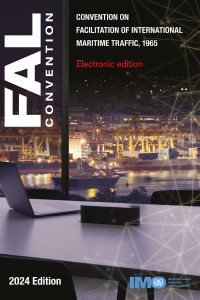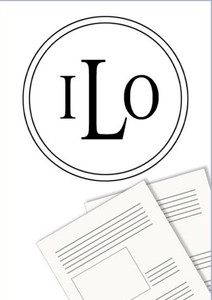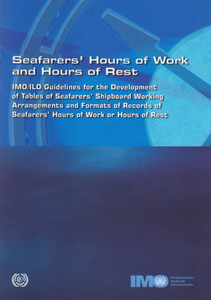
More than ten years have passed since the entry into force of the ILO Maritime Labour Convention (MLC), which is now strictly enforced on a global basis and subject to Port State Control inspection. This ICS publication is the comprehensive and definitive guide to the MLC. The revised fourth edition addresses the wide range of MLC provisions, including the 2022 updates, which will enter into force in December 2024.
More than ten years have passed since the entry into force of the ILO Maritime Labour Convention (MLC), which is now strictly enforced on a global basis and subject to Port State Control inspection. This ICS publication is the comprehensive and definitive guide to the MLC. The revised fourth edition addresses the wide range of MLC provisions including the 2022 updates, which will enter into force in December 2024, covering:
- Appropriately-sized personal protective equipment;
- Drinking water quality;
- Repatriation of abandoned seafarers;
- Repatriation of deceased seafarers;
- Medical care;
- Social connectivity;
- Information on rights concerning compensation; and
- Recording and reporting of deaths.
Foreword
Ten years have passed since the global entry into force of the International Labour Organization (ILO) Maritime Labour Convention (MLC), which the International Chamber of Shipping (ICS), as an official ILO Social Partner, negotiated with seafarers’ unions and governments prior to its adoption in 2006. ICS therefore has a special interest in promoting strict compliance by shipping companies with the ILO MLC to ensure maintenance of a global level playing field for good employment standards.
The ILO MLC is a truly ground-breaking instrument. The shipping industry is unique in being the only industrial sector to have such a comprehensive global regime in place, setting out mandatory standards for the employment of the world’s two million merchant seafarers, which are now strictly enforced by governments worldwide through a sophisticated system of flag state inspections and port state control.
Together with the International Conventions for the Safety of Life at Sea (SOLAS), Prevention of Pollution from Ships (MARPOL) and Standards of Training, Certification and Watchkeeping for Seafarers (STCW) adopted by the International Maritime Organization (IMO), the ILO MLC is now recognised as the fourth key pillar of the shipping industry’s global regulatory framework.
ICS is committed to helping shipping companies provide decent work for the seafarers they employ, and the latest edition of these Guidelines provides detailed information about compliance with the ILO Convention and the obligations of maritime employers which the ILO MLC sets out. This includes new information about best practice and amendments made to the Convention since 2013, most recently in 2022 in response to some of the challenges presented by the Coronavirus (COVID-19) pandemic.
These Guidelines are likely to be particularly helpful to senior managers in shipping companies and crewing agencies, including personnel and human resources managers, as well as masters and senior officers serving on board merchant ships. In view of the potential overlap of ILO MLC requirements with the IMO International Safety Management (ISM) Code, these ICS Guidelines should also be useful for designated persons ashore as defined by ISM requirements.
The ILO MLC sets out a wide range of mandatory obligations which a ship’s flag state must require shipping companies to comply with fully. The aim of this new edition of these ICS Guidelines is to provide an updated overview of the MLC provisions to which maritime employers are required to adhere, both in the best interests of crew welfare and for safe and efficient ship operations.
Seafarers are entitled to expect that their fundamental rights will always be respected, irrespective of the flag of the ship on which they serve or their country of residence. Shipping was the very first globalised industry before the word globalisation had even been coined. Ships may be owned in one country, managed from another, registered in a third country and crewed by seafarers from many others. The industry would be unable to function effectively without robust labour standards which are universally applicable to all ships trading around the world.
This fourth edition of these ICS Guidelines builds on the previous editions and draws on practical experience gained since the Convention entered into force. It includes detailed extracts from the MLC, which have been colour coded to help understanding of the various Regulations, Standards and Guidelines. The latest ILO MLC requirements agreed in 2022 are also highlighted for ease of reference.
Editorial notes
Abbreviations
Definitions
Chapter 1
Key issues, certification and enforcement and
seafarers’ rights 15
1.1 Purpose and origins of the MLC
1.2 Convention structure
1.3 Labour standards overview
1.4 Entry into force, implementation and enforcement
1.5 Application
1.5.1 Application to ships
1.5.2 Application to seafarers
1.6 Links between the MLC, the STCW Convention and the ISM Code
1.7 MLC explanatory note
Chapter 2
Fundamental seafarer rights 29
2.1 Freedom of association
2.2 Collective bargaining
2.3 Protection from discrimination, harassment and bullying
2.4 Promoting diversity and inclusion in shipping
Chapter 3
Flag state inspection and certification 35
3.1 Flag state inspections
3.2 Areas to be inspected
3.3 Inspectors’ powers
3.4 MLC certification
3.4.1 Maritime labour certificate
3.4.2 Declaration of maritime labour compliance
3.4.3 Interim certificates
Chapter 4
Port state control 53
4.1 Normal inspections
4.2 Grounds for a more detailed inspection
4.3 Detention of a ship
4.4 Common MLC deficiencies
Chapter 5
Minimum requirements for seafarers to work on a ship 65
5.1 Minimum age
5.2 Medical certificate
5.3 Training and qualifications
5.4 Recruitment and placement
5.4.1 General principles
5.4.2 Government obligations
5.4.3 Shipowner obligations
5.4.4 Oversight of third party recruitment services
Chapter 6
Young seafarers and the MLC 79
6.1 Minimum age of seafarers
6.2 Working hours of young seafarers
6.3 Medical certification for young seafarers
6.4 Young seafarers and food and catering
6.5 Repatriation of young seafarers
6.6 Safety and health education of young seafarers
Chapter 7
Conditions of employment 87
7.1 Shipowner obligations
7.2 Seafarers’ employment agreements
7.3 Wages
7.3.1 ILO minimum wage
7.3.2 Definitions for the calculation of wages
7.3.3 Overtime
7.3.4 Consolidated wages
7.3.5 General principles for payment of wage deductions
7.4 Hours of work and rest
7.4.1 MLC and STCW rest requirements
7.4.2 The hours of work and rest regimes
7.4.3 Schedule of working
7.4.4 Record keeping
7.4.5 Permitted exceptions
7.4.6 Hours of work for young seafarers
7.5 Entitlement to shore leave
7.5.1 Calculation of entitlement for paid leave
7.5.2 Other considerations
7.6 In the event of loss or foundering
7.6.1 In the event of a hostage situation
7.7 Crewing levels
7.8 Career development
Chapter 8
Accommodation and recreational facilities 119
8.1 Application to new and existing ships
8.2 Ongoing compliance
8.3 Design and construction
8.4 Prevention of noise and vibration
8.5 Heating, air conditioning and ventilation
8.6 Lighting
8.7 Living accommodation
8.7.1 Sleeping rooms
8.7.2 Mess rooms
8.7.3 Hospital
8.7.4 Laundry
8.7.5 Facilities for engine personnel
8.7.6 Ship’s office
8.7.7 Sanitary facilities
8.8 Recreational facilities
8.8.1 Social connectivity
8.8.2 Open decks
8.8.3 Mail and ship visits
8.8.4 Shore leave
8.9 Guidance for ships constructed before the MLC entered into force
8.9.1 Maintenance of accommodation for ships constructed before the MLC entered into force
8.9.2 Ventilation for ships constructed before the MLC entered into force
8.9.3 Sanitary accommodation for ships constructed before the MLC entered into force
Chapter 9
Food and catering 151
9.1 Shipowners’ obligations
9.1.1 Food storage and sufficient food
9.1.2 Condition of galley
9.1.3 Vermin control
9.1.4 Drinking water
9.2 Ships’ cooks
9.2.1 Ship’s cook’s training
9.3 Inspection by the master
Chapter 10
Health protection and medical care 161
10.1 The provisions for health, safety and medical care
10.2 Limitations permitted by national law for payment in the event of illness or injury
10.3 Medical care on board ship
10.4 Medical qualifications of seafarers
10.5 Carriage requirements for medical equipment
10.6 Diseases
Chapter 11
Health and safety protection
11.1 Personal protective equipment
11.2 Prevention of noise and vibration
11.3 Young seafarers’ health and safety
11.4 Other issues
11.5 Shipowner obligations on accident prevention
11.6 National health and safety protection and prevention programmes
11.6.1 Instruction in occupational safety and health protection and the prevention of occupational accidents
11.7 Reporting and collection of statistics
11.7.1 Investigations
11.8 Investigation into the deaths of seafarers
Chapter 12
Shipowners’ liability to protect seafarers from the
consequences of sickness, injury and death 185
Chapter 13
Seafarers’ welfare 191
13.1 Access to shore based welfare facilities
Chapter 14
Social security 195
14.1 Social security
14.2 Seafarers’ Pension Convention
Chapter 15
Repatriation 199
15.1 Shipowner obligations
15.2 Circumstances where repatriation is required
15.3 Costs to be met by the shipowner
15.4 Repatriation in the event of abandonment
15.5 Reimbursement of expenses in the event of abandonment
Chapter 16
Death in service of a seafarer 209
16.1 Repatriation of a body in the event of a fatality
16.2 The seafarer’s effects
16.3 Seafarer compensation in the event of a fatality
Chapter 17
Complaint procedures 213
17.1 On board complaints
17.2 Complaints to other parties
17.3 Contractual redress for seafarers
Appendix 219
Checklist to help masters and shipowners ensure compliance with MLC
ICS
The International Chamber of Shipping (ICS) is the principal international trade association for the shipping industry, representing shipowners and operators in all sectors and trades. ICS membership comprises national shipowners' associations in Asia, Europe and the Americas whose member shipping companies operate over 80% of the world's merchant tonnage.
Established in 1921, ICS is concerned with all technical, legal, employment affairs and policy issues that may affect international shipping.
ICS represents shipowners with the various intergovernmental regulatory bodies that impact on shipping, including the International Maritime Organization.
ICS also develops best practices and guidance, including a wide range of publications and free resources that are used by ship operators globally.
- Number of Pages:
- 232
- Published Date:
- May 2023
- Book Height:
- 0 mm
- Book Width:
- 0 mm
- Author:
International Chamber of Shipping
- Preview:
- Yes
- Publication Date:
- May 2023






